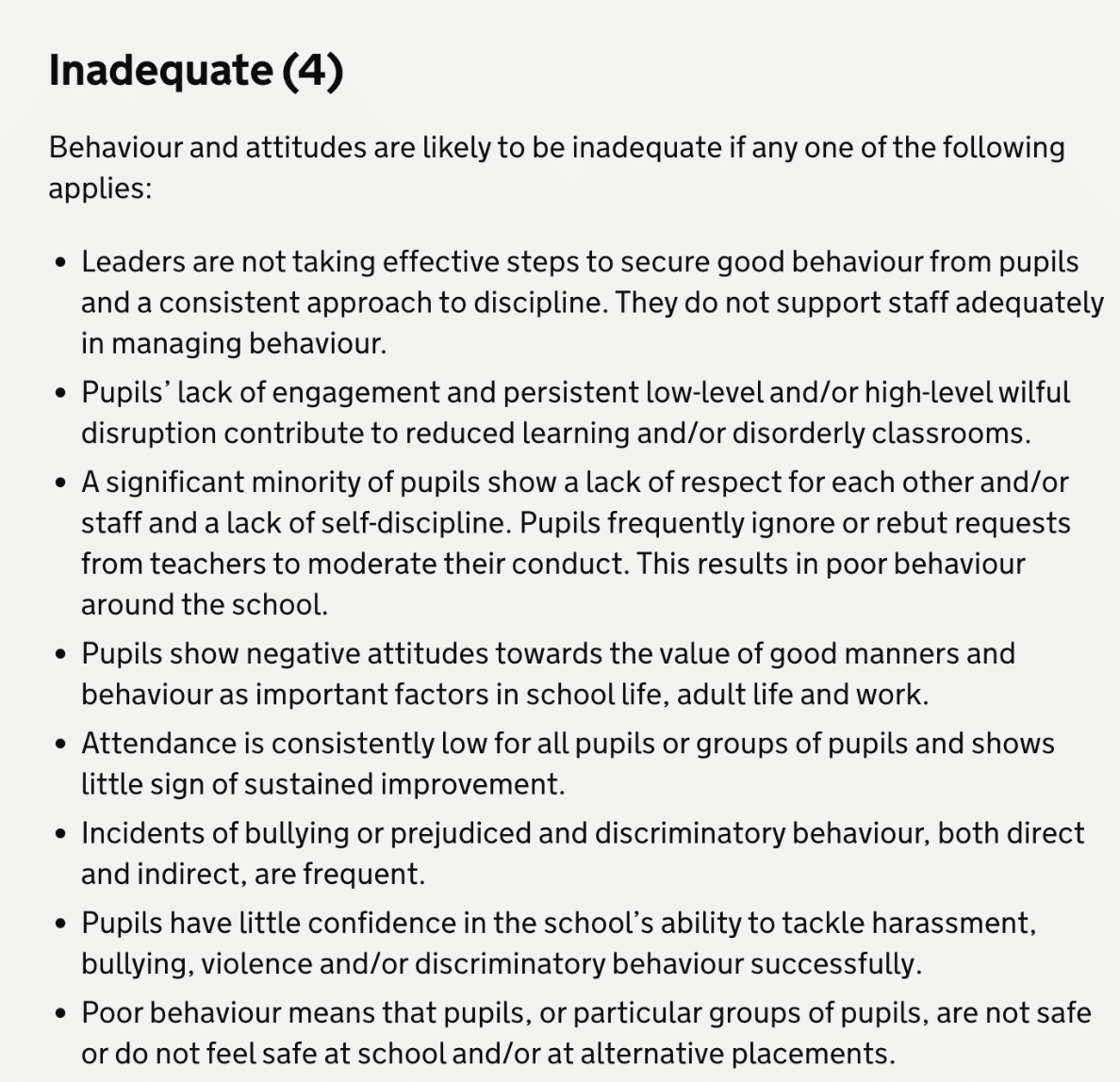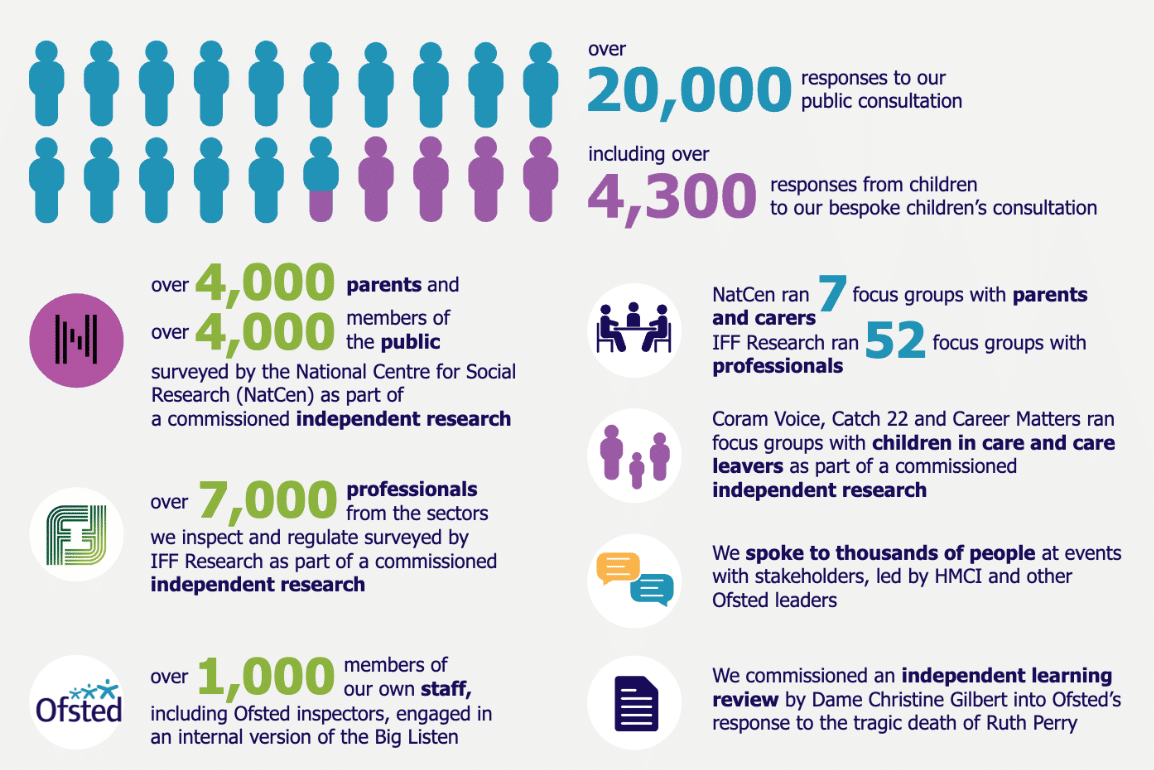Ofsted Inspection Handbook 2024: what does it mean for school staff?
Contents
Overview
The Department for Education (DfE) explains that schools in England will no longer receive Ofsted single headline grades, also known as single word judgements. This change has been reflected in the Ofsted School Inspection Handbook published in September 2024, which came into force on 16 September 2024.
The reforms to Ofsted grading mark a significant shift in how schools in England are evaluated, moving away from the previous system of single-word overall judgments like “Outstanding” or “Inadequate”.
Instead, schools will receive more detailed assessments across four categories: the quality of education, behaviour and attitudes, personal development, and leadership and management.
This shift is designed to reduce the pressure on schools and give parents clearer insights into specific areas of school performance rather than a single summary judgement.
Overall effectiveness grades given before September 2024 will continue to be visible on schools’ inspection reports and on Ofsted’s website.
Also, schools which are fully inspected from September 2024 onwards will no longer be able to use the Ofsted judgement logos as they relate only to overall effectiveness.

In this article, we provide a summary of the major changes, how it impacts on school staff and link to relevant documents.
We recommend reading Ofsted’s School Inspection Handbook in detail for further information as we just provide a summary of the main points below.
Why is Ofsted removing single headline grades?
These reforms come in response to widespread criticism, particularly following the tragic case of headteacher Ruth Perry, whose suicide was linked by a coroner to the stress of an Ofsted inspection downgrading her school. The new system aims to alleviate some of the pressures associated with the previous grading system.
In addition, Ofsted research found fewer than four in 10 parents, and only 29% of teachers, supported one-word judgements. Ofsted identified as part of its Big Listen consultation that single-word grades provided a very limited view of a school’s overall performance. They failed to reflect the complexities of running a school, where strengths and weaknesses may vary across different areas. Schools often found that a single flaw, such as a safeguarding issue, could result in a harsh overall judgement, even if they excelled in other areas.
Ofsted Inspection Handbook: what is changing with the grades?
Schools that receive a graded inspection will still be given grades for the four current sub-judgements, but will not receive an overall grade.
The four sub-judgements are:
- Leadership and management
- Quality of education
- Personal development
- Behaviour and attitudes
An example of an ‘Inadequate’ grade descriptor can be seen below for ‘Behaviour and attitudes’:

What are common misconceptions about inspections?
Ofsted explains that there can be many myths and misconceptions about school inspections. Ofsted will not:
- Grade individual lessons
- Advocate a particular method of planning (including lesson planning), teaching or assessment, or expect curriculum planning to be in any specific format
- Require schools to provide individual lesson plans or previous lesson plans
- Require schools to provide recordings of live lessons that are delivered remotely, unless they are normally stored for staff or pupils’ future use
- Require schools to carry out a specified amount of lesson observation
- Take a random sample of exercise books/folders/sketchbooks/electronic files or evaluate individual workbooks or expect workbooks to be compiled solely to provide evidence for inspection
- Use work scrutiny to evaluate teachers’ marking
- Specify the frequency, type or volume of marking and feedback
- Require schools to ensure a particular frequency or quantity of work in pupils’ books or folders
- Require photographic evidence of pupils’ work (although inspectors may ask to take photographs themselves of pupils’ work, and will take all reasonable steps to anonymise these)
Ofsted Inspection Handbook: timing of inspections
In the Ofsted Inspection Handbook, it explains an inspection can take place at any point from five school days after the first day pupils attend in the autumn term. For example, if pupils return to school on a Wednesday, an inspection can take place as early as the following Wednesday.
In general, Ofsted’s policy is that a school judged outstanding or good for overall effectiveness before September 2024 will usually be inspected within the 4 academic years following its last inspection.
A school judged ‘requires improvement’ or inadequate for overall effectiveness before September 2024 will usually be inspected within 2.5 years. The Inspection Handbook goes into much more detail here.
Notification of inspection
Ofsted will contact the school by telephone to announce a graded or ungraded inspection after 9.30am on a Monday morning. Schools may be notified of an urgent or monitoring inspection on any day. Also, if a school has been notified of an inspection that is subsequently deferred, Ofsted can notify that school of the new inspection date on any day of the week. If a school is open in a week that includes a bank holiday, Ofsted may notify the school on the Tuesday of that week.
By exception, Ofsted reserves the right to carry out a graded, ungraded or urgent inspection without notice. Where this is the case, the lead inspector will normally telephone the school about 15 minutes before arriving on site.
Prep telephone call from the lead inspector to the headteacher
Once Ofsted have informed the school of the inspection, the lead inspector will contact the school by telephone or video and ask to speak to the headteacher.
Inspectors’ preparatory telephone conversations with headteachers have two elements:
- A short inspection-planning conversation that focuses on practical and logistical arrangements
- A longer, reflective, educationally focused conversation about the school’s progress since the last inspection, including how COVID-19 has affected this
The inspection planning conversation will be short and focused on practical issues. The lead inspector will:
- Check on the headteacher’s well-being, and find out whether any steps need to be taken to ensure any issues or concerns are addressed, including that appropriate support is available. The lead inspector should ascertain how to contact whoever is responsible for the headteacher’s well-being on a day-to-day basis (normally the local authority or trust), so that they can pass on well-being concerns when appropriate and necessary
- Make the school aware of the help and support for the headteacher’s and staff’s well-being that is available through the charity Education Support
The Handbook goes into much more precise detail about all elements of what happens during the inspection itself.
School Report Cards to be introduced in 2025
The DfE explains that it will introduce School Report Cards from September 2025 which will provide parents with a full and comprehensive assessment of how schools are performing and ensure that inspections are more effective in driving improvement.
A formal consultation will begin in January 2025. This shift represents a broader move by Ofsted to focus on holistic and detailed assessments rather than overly simplistic judgments.
It is understood the inspectorate has looked at the model used by His Majesty’s Inspectorate of Constabulary and Fire & Rescue Services (HMICFRS).
In a Schools Week article, it explains the reports “allow the public to see how well their local service or force is performing and improving year on year, from a set of easy-to-understand categories”.
We will update this article when more information becomes available.
Consultation outcome from the Big Listen
Ofsted’s “Big Listen” consultation, launched in early 2024, aimed to gather wide-ranging feedback from educators, parents, and professionals to reform inspection practices. The Big Listen was the largest consultation in Ofsted’s history.

Ofsted has published a detailed response to its ‘Big Listen’ consultation, setting out how the inspectorate will reset its relationship with the sectors it inspects and regulates.
The summary of the key actions from Ofsted are:
- We will reset our relationship with those we regulate and inspect, working collaboratively with them to put children and learners first
- We will foster a culture of integrity in which we always treat people with professionalism, courtesy, empathy and respect
- We will be a learning organisation that operates transparently, listens to challenge and takes action to change
School staff affected by an Ofsted inspection
If you are an Edapt subscriber and have been affected by an Ofsted inspection which has had a direct impact on your employment, you can contact us for advice and support.
Ofsted Inspection Handbook: further reading
The information contained within this article is not a complete or final statement of the law.
While Edapt has sought to ensure that the information is accurate and up-to-date, it is not responsible and will not be held liable for any inaccuracies and their consequences, including any loss arising from relying on this information. This article may contain information sourced from public sector bodies and licensed under the Open Government Licence. If you are an Edapt subscriber with an employment-related issue, please contact us and we will be able to refer you to one of our caseworkers.
